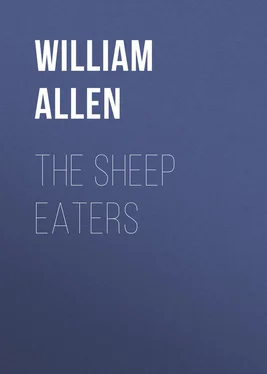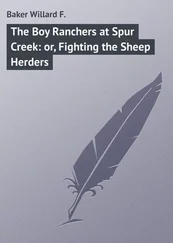William Allen - The Sheep Eaters
Здесь есть возможность читать онлайн «William Allen - The Sheep Eaters» — ознакомительный отрывок электронной книги совершенно бесплатно, а после прочтения отрывка купить полную версию. В некоторых случаях можно слушать аудио, скачать через торрент в формате fb2 и присутствует краткое содержание. Жанр: foreign_antique, foreign_prose, на английском языке. Описание произведения, (предисловие) а так же отзывы посетителей доступны на портале библиотеки ЛибКат.
- Название:The Sheep Eaters
- Автор:
- Жанр:
- Год:неизвестен
- ISBN:нет данных
- Рейтинг книги:4 / 5. Голосов: 1
-
Избранное:Добавить в избранное
- Отзывы:
-
Ваша оценка:
- 80
- 1
- 2
- 3
- 4
- 5
The Sheep Eaters: краткое содержание, описание и аннотация
Предлагаем к чтению аннотацию, описание, краткое содержание или предисловие (зависит от того, что написал сам автор книги «The Sheep Eaters»). Если вы не нашли необходимую информацию о книге — напишите в комментариях, мы постараемся отыскать её.
The Sheep Eaters — читать онлайн ознакомительный отрывок
Ниже представлен текст книги, разбитый по страницам. Система сохранения места последней прочитанной страницы, позволяет с удобством читать онлайн бесплатно книгу «The Sheep Eaters», без необходимости каждый раз заново искать на чём Вы остановились. Поставьте закладку, и сможете в любой момент перейти на страницу, на которой закончили чтение.
Интервал:
Закладка:
William Alonzo Allen
The Sheep Eaters
CHAPTER I
AN EXTINCT MOUNTAIN TRIBE
The Sheep Eaters were a tribe of Indians that became extinct about fifty years ago, and what remaining history there is of this tribe is inscribed upon granite walls of rock in Wyoming and Montana, and in a few defiles and canyons, together with a few arrows and tepees remaining near Black Canyon, whose stream empties into the Big Horn River. Bald Mountain still holds the great shrine wheel, where the twenty-eight tribes came semi-annually to worship the sun, and in the most inaccessible places may still be found the remains of a happy people. Small in stature and living among the clouds, this proud race lived a happy life far removed from all other Indians.
The Shoshones seem to be a branch of the Sheep Eaters who afterwards intermarried with the Mountain Crows, a tall race of people who gave to the Shoshones a taller and better physique. From what can be gleaned, the Sheep Eater women were most beautiful, but resembled the Alaskan Indians in their shortness of stature.
These people drew their name from their principal article of food, Mountain Sheep, although, when winter set in, elk and deer were often killed when coming down before a driving snow storm.
Their home life was simple. They lived in the grassy parks of the mountains which abounded in springs of fresh water, and were surrounded by evergreens and quaking asps and sheltered by granite walls rising from fifty to a thousand feet high. Their tepees were different from those of all other tribes, and were not covered with rawhide but thatched with quaking asp bark, and covered with a gum and glue made from sheep's hoofs. Another variety were covered with pitch pine gum.
In this manner lived the twenty-eight tribes of Sheep Eaters, carving their history on granite walls, building their homes permanently among the snowy peaks where they held communion with the sun, and worshipping at their altar on Bald Mountain, which seems likely to remain until the Sheep Eaters are awakened by Gabriel's trumpet on the morning of the resurrection.
Never having been taught differently, they believed in gods, chief of which was the sun, and consecrated their lives to them; and their eternal happiness will be complete in the great Happy Region where all is bright and warm. The great wheel, or shrine, of this people is eighty feet across the face, and has twenty-eight spokes, representing the twenty-eight tribes of their race. At the center or hub there is a house of stone, where Red Eagle held the position of chief or leader of all the tribes. Facing the north-east was the house of the god of plenty, and on the south-east faced the house of the goddess of beauty; and due west was the beautifully built granite cave dedicated to the sun god, and from this position the services were supposed to be directed by him. Standing along the twenty-eight spokes were the worshippers, chanting their songs of praise to the heavens, while their sun dial on earth was a true copy of the sun.
A short time ago I learned that among the Mountain Crows there lived an old woman, who was the very last of her tribe, and who was so old she seemed like a spirit from another world. She had outlived her people and had wandered away from her home on the mountains into the valleys, living on berries and wild fruit as she wandered. She alone could read the painted rocks and tell their meaning, and could relate the past glories of the tribe and the methods of the arrow makers, who transformed the obsidian into the finished arrows ready to kill the mountain ram.
I was very anxious to see this creature, who had outlived her race and her usefulness, and so one day I saddled my horse, Billie, put on my cartridge belt, took my rifle in my hand, and set out for the mountains where I knew a small band of Mountain Crows were hunting buffalo on Wind River.
After a long ride I passed Bovay Creek and struck the Buffalo Trail, which led directly toward the mountains. It soon headed toward the south and I crossed a mountain stream and headed toward the Big Horn Canyon. I had gone about two miles when I discovered something to my right sitting on the remains of a mountain cedar, and in a moment I was on the scene. I pulled up my horse and dismounted and discovered that I had found the object of my search, the Sheep Eater squaw.
CHAPTER II
THE OLD SQUAW'S TALE
Passing the Big Horn Canyon, where the rushing waters were beaten into spray, and where granite walls were shining like great sapphires reflected in the sun's bright rays, I wondered how many centuries it took to chisel that mighty water way fifty-two miles through this tortuous mountain. Perpendicular walls of fully 2000 feet are standing sentinels above this silvery water which goes roaring and foaming through the narrow abyss.
The golden eagle closes its wings and falls through space like a rocket from some unknown world, uttering a scream that resounds like a crash of lightning. The Big Horn, proudly perched on yonder crag, bids defiance to all living creatures. For fifteen miles this box canyon has cut through the backbone of the mountains and holds the clear waters as in the palm of one's hand. At the mouth of the canyon, where the waters flow calm as a summer lake, as though tired from their terrible journey, the rounded boulders, the white sands and quartz that have passed through, are resting, peaceful as the wild rose which waves to and fro in the spring zephyrs.
In the sand lies a dead cedar. Torn from the mountain top and crashing down the canyon, it was carried by the rushing waters out on to the beach and deposited in the sand. Sitting on a branch of this cedar is an old woman. Her white locks hang crisp and short on her bony shoulders; her face is covered with a semi-parchment, brown as the forest leaves, and drawn tight over her high cheek bones; her eyes are small and sunken in her head, but the fire has not yet gone out. An old elk skin robe, tattered and torn, is thrown across her shoulders, with its few porcupine quills still hanging by the sinew threads where they were placed a century ago. The last of her race! Yes, long ago her people have become extinct, passed away leaving her to die. But alas, death does not claim her, and she wanders alone until picked up by the mountain Absarokees.
I sat down by her side and asked her by sign talk: "Are you a Sioux?" She shook her head. "Are you a Blackfoot?" Again she shook her head, and the effort seemed to tire her. I made many signs of the different tribes, but in the Crow sign she said "No" to them all. Her form seemed to be of rawhide, and on her fingers were still a few old rings made from the horn of the bighorn ram.
I gave her some of my lunch, as I ate, and she munched it with a set of old teeth worn to the gums. She ate in silence until all was gone; then I told her I was a medicine man, and asked her how old she was. She held up ten stubs of fingers, all of which had been partly cut off while mourning for dead relatives, then took them down until she had counted one hundred and fifteen years. Her eyes brightened, and she fronted away to the main range to a towering crag of granite, facing the north, where Bull Elk Canyon empties into the Big Horn. She held her withered arm high above her head and said in sign language:
"My people lived among the clouds. We were the Sheep Eaters who have passed away, but on those walls are the paint rocks, where our traditions are written on their face, chiseled with obsidian arrow heads. Our people were not warriors. We worshipped the sun, and the sun is bright and so were our people. Our men were good and our women were like the sun. The Great Spirit has stamped our impressions on the rocks by His lightnings; there are many of our people who were outlined on those smooth walls years ago; then our people painted their figures, or traced them with beautiful colored stones, and the pale face calls them "painted rocks." Our people never came down into the valleys, but always lived among the clouds, eating the mountain sheep and the goats, and sometimes the elk when they came high on the mountains. Our tepees were made of the cedar, thatched with grey moss and cemented with the gum from the pines, carpeted with the mountain sheep-skins, soft as down. Our garments were made from the skins of the gazelle, and ornamented with eagle feathers and ermine and otter skins.
Читать дальшеИнтервал:
Закладка:
Похожие книги на «The Sheep Eaters»
Представляем Вашему вниманию похожие книги на «The Sheep Eaters» списком для выбора. Мы отобрали схожую по названию и смыслу литературу в надежде предоставить читателям больше вариантов отыскать новые, интересные, ещё непрочитанные произведения.
Обсуждение, отзывы о книге «The Sheep Eaters» и просто собственные мнения читателей. Оставьте ваши комментарии, напишите, что Вы думаете о произведении, его смысле или главных героях. Укажите что конкретно понравилось, а что нет, и почему Вы так считаете.












